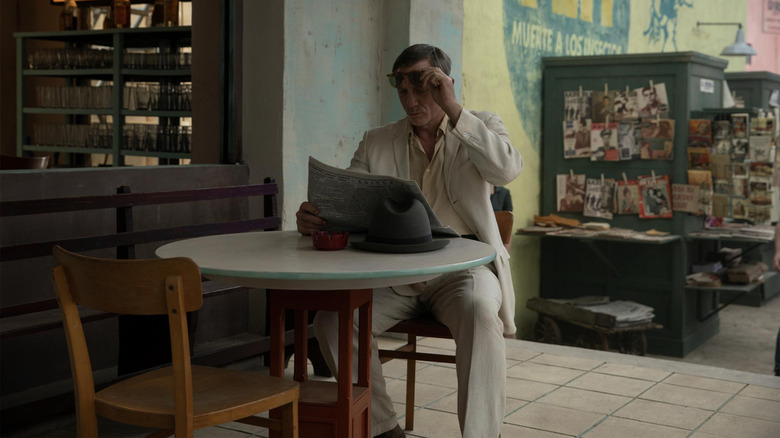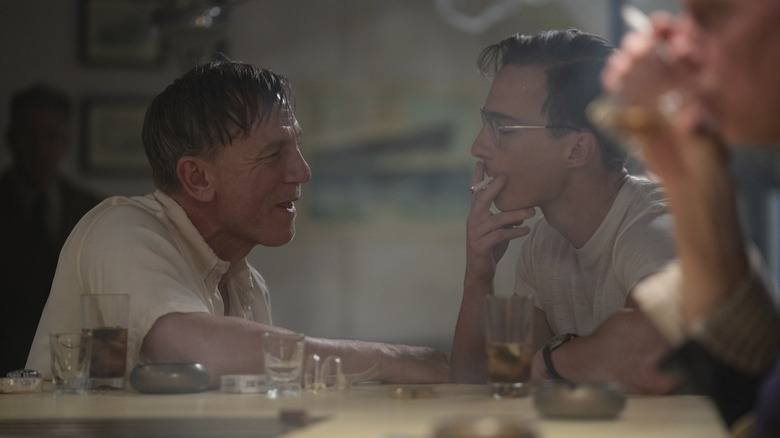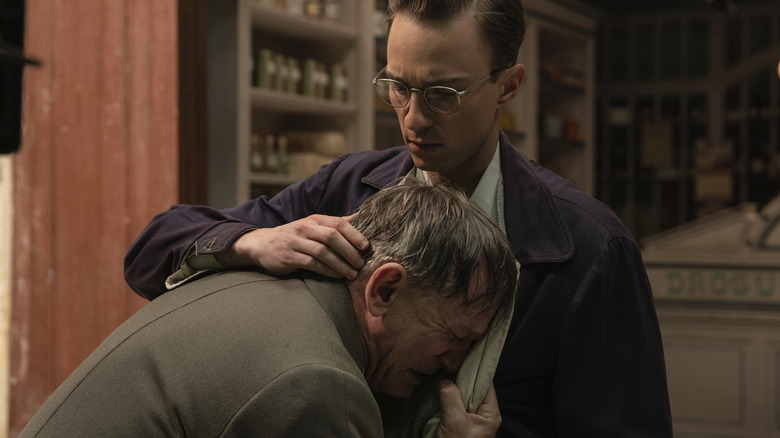Queer Review: Daniel Craig Is Sensational In Luca Guadagnino's Must-See Odyssey [NYFF]
How lucky are we to be around at the same time that Luca Guadagnino is doing his thing? The Italian director has delivered some of the boldest and most uncompromising works of the last decade and change, one as recent as earlier this year. He's also gone even further and maintained an exceptionally keen eye for finding the stories worth telling in the first place. His latest, conceptualized during filming of "Challengers" and written by "Challengers" scribe Justin Kuritzkes, sets its sights on no less a figure than wildly influential novelist William S. Burroughs. Burroughs' life and overall body of work could never be contained in a single biopic (though many have tried), so "Queer" takes the next best approach: an adaptation of his unfinished short story of the same name, reimagined as an intimate epic that almost feels designed to perplex and provoke in equal measure.
The headlines all but write themselves. Star Daniel Craig is downright sensational in what proves to be a transformative role, initially playing on our expectations of his world-famous James Bond performance before gleefully tearing those assumptions apart over the course of its 135-minute runtime. The plethora of explicit sex scenes have had tongues wagging for months, all of which live up to the hype and double as a cheeky, self-aware apology for those "Call Me By Your Name" criticisms of playing things safe. And then there's the freewheeling odyssey at the heart of this story, which mixes lust, love, and self-loathing into a sweaty cauldron of emotions. Yet what best defines the experience of watching "Queer" isn't what's on the surface, but what's underneath it — the roiling and completely unpredictable path that the narrative takes every step of the way to its final destination.
What starts out as another quintessentially Guadagnino dramatization of two men caught up in a torrid dynamic of pushes and pulls ends, fittingly enough, as an abstract tone poem. Like Burroughs himself, many will find this movie confounding and chaotic to the extreme, and one you'll need to see to believe.
Daniel Craig is a commanding force in Queer
Though "Queer" is named after one of William S. Burroughs' most famous works, its inspirations reach far, far deeper into the troubled writer's life and times. True to form, Daniel Craig is our eyes and ears into this post-war period setting of Mexico as the blustering American expat William Lee. Guadagnino gets all sorts of mileage out of playing with the idea that this clearly meant to be Burroughs' self-insert character, from recreating the various real-life looks of the writer through his dapper costume design to incorporating some of the darkest moments of his years spent in Mexico. Having fled the States to avoid a drug charge (and possibly worse, it's implied), Lee spends all of his free time knocking back liquor with his best bud Joe (Jason Schwartzman, rockin' a dad bod and constantly cracking wise like it's nobody's business), frequenting gay bars throughout the dusty town (accompanied by some delightfully anachronistic needle drops), and prowling for various young men who might be open to his blunt-force advances ... and lots of attachment-free sex.
Lee might seem like he's just walked off the set of "No Time To Die," with a dash of any given Humphrey Bogart character thrown in for good measure, but Craig's mastery of his own physical acting reminds us why he's so much more than his Bond persona. He oozes charisma and charm every time he swaggers through the doors, but all it takes is a brutal rejection or two for him to go from confident to a sullen middle-aged man in no time at all. The star conveys so much with the simple flip of his glasses from forehead to face (an act he repeats on multiple occasions and, somehow, to completely different effect each time) or a rueful smile meant for an audience of none. In fact, Lee's tendency towards long-winded soliloquies and occasionally poignant observations might even remind audiences of another brilliant Craig performance — his Kentucky-fried detective Benoit Blanc. And when the tone demands something more heightened, Guadagnino surges through the gap to provide his own stylistic flourishes: dropping out the sound, distorting Craig's features like a static-filled television set, and even using evocative double exposure techniques to show a much deeper pain beneath the skin.
Yet when Craig's William Lee first lays eyes on Eugene Allerton (Drew Starkey) during a slow-motion sequence in the moonlit streets, time itself seems to stop and sparks almost literally begin to fly over nothing more than their heated gaze. Thus begins a largely one-sided obsession that dominates the rest of the story, one in which Starkey matches Craig note for note ... yet constantly maintains an air of mystery. This is truly a Manic Pixie Dream Boy in every sense of the phrase and Starkey invites viewers to read into his every inscrutable expression for a sense of what he might be thinking. And throughout the next two acts (helpfully split into on-screen chapter treatments), Eugene leads Lee on a cat-and-mouse chase unlike any you've ever seen.
Queer is the most unconventional of love stories
How far would you be willing to go and what would you be willing to give up in a quest for communication? "Queer" has absolutely no shortage of Big Ideas it hopes to tackle, from the very notion of what it means to be "queer" (a complicated question addressed pointedly out loud several times) to our awfully human need for attachment and affection. What absolutely dominates every frame of the film, however, is the ever-present concern of how an emotionally unavailable addict could possibly forge a meaningful connection with the most sphinxlike enigma to ever cross the border. An intentional blank slate from his very first scene, Eugene at first baffles Lee (an early conversation over a steak dinner, where Lee attempts to suss out his crush's unlabeled sexuality, is a masterclass in cringe comedy done right) before eventually letting him break through his chilly exterior. Their intimate moments together make for some of the most sensual and tender that Guadagnino has ever committed to the screen. It's just too bad the good times abruptly end the moment they finish, as Eugene spends his nights tumbling with his paramour in bed and his days flaunting a beautiful woman around town whom he may or may not be involved with.
If this maddening dynamic begins to grate on audiences, particularly during a circuitous middle act that takes its time getting to a much more thrilling detour, it's nothing compared to the torture inflicted upon Lee. Communication isn't so easy when paired with someone who practically never bothers to open his mouth. A pivotal line of dialogue turns into a rallying cry, of sorts, when Lee drunkenly proclaims, "I want to talk to you ... without speaking."
As if to make up for any verbal deficiencies, Guadagnino and his creative team go above and beyond to make "Queer" a feast for the eyes. The painterly outdoor backgrounds of the Mexican town (a feat that demands a special shoutout to production designer Stefano Baisi) are only outdone by the sumptuous interior sets, lit by natural sources (a moonlit date and a make-out session at sunset are particular highlights) but imbued with a sense of theatricality. Guadagnino's longtime cinematographer Sayombhu Mukdeeprom ("Challengers," "Suspiria," "Call Me By Your Name") takes this challenge and runs with it, nearly one-upping his own contributions to M. Night Shyamalan's "Trap" with camerawork that treats Craig's face like a canvas and Lee's schoolboy overtures to Eugene as a spirited dance. And whenever the pacing threatens to sag, the thrumming score by Trent Reznor and Atticus Ross provides a much-needed boost of momentum.
When "Queer" kicks into its final stretch, the sprinkles of dreamlike visuals and context-less imagery throughout the film turns into an abstract flood as Lee searches for the ultimate answer to his conundrum (through a psychedelic plant known as ayahuasca, natch) while fighting off the effects of heroin withdrawal. Things gets truly dark before building to an ending as discomfiting and interpretive as Guadagnino's past explorations into horror. Whether this atypical Burroughs adaptation and unconventional love story truly works for you in the end or not, you won't regret getting swept up in the journey.
/Film Rating: 8.5 out of 10
"Queer" will release in theaters November 27, 2024.


